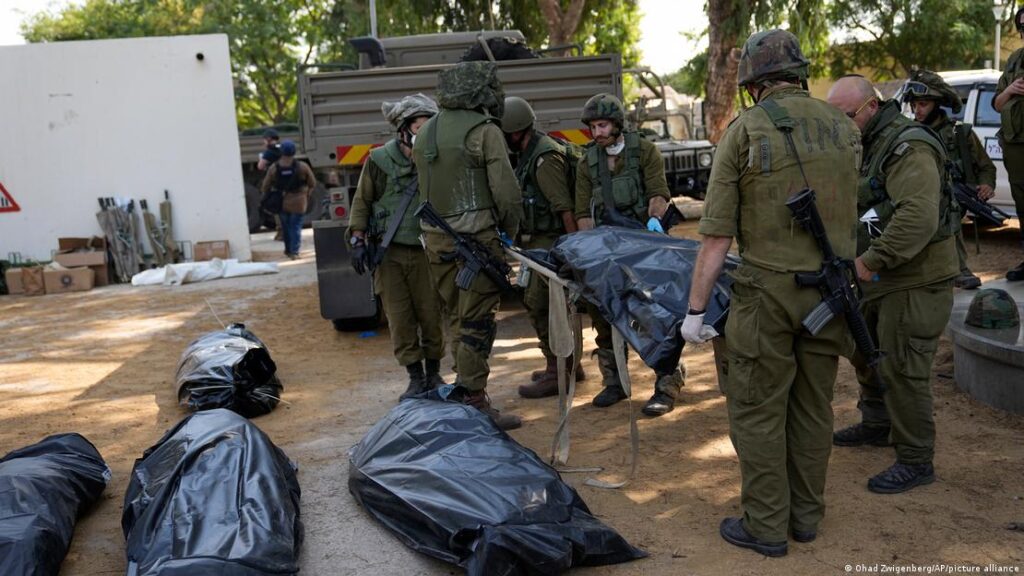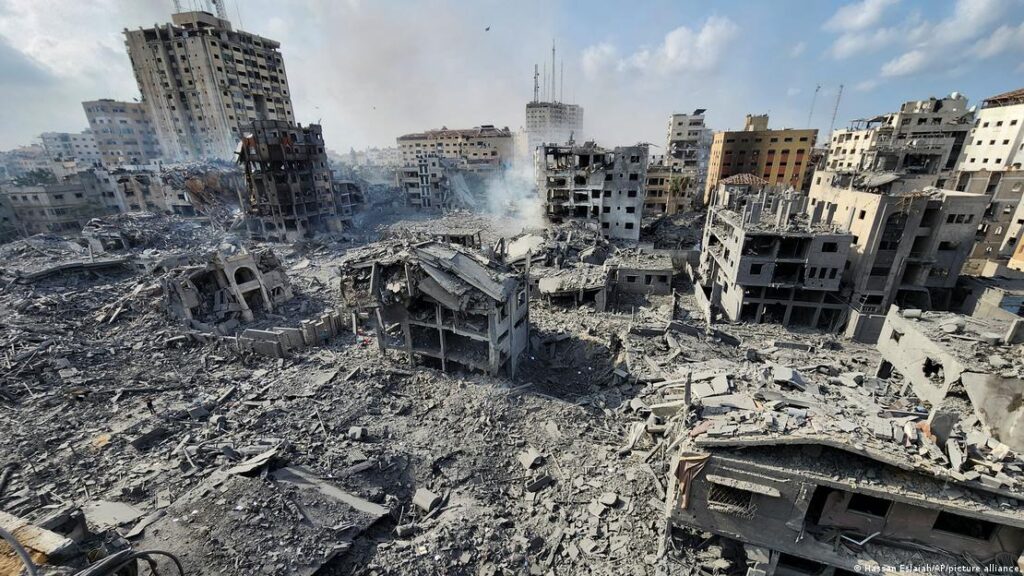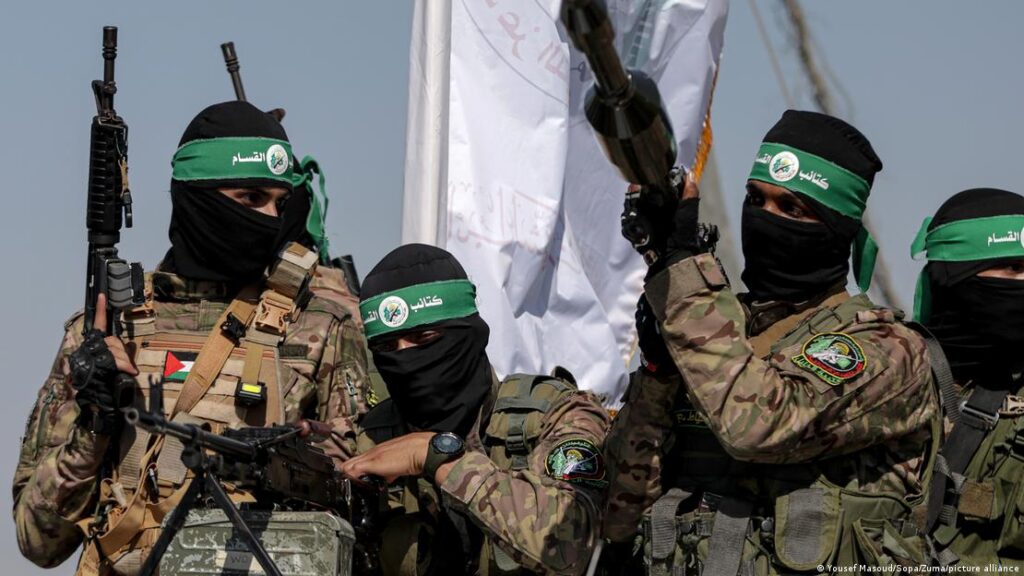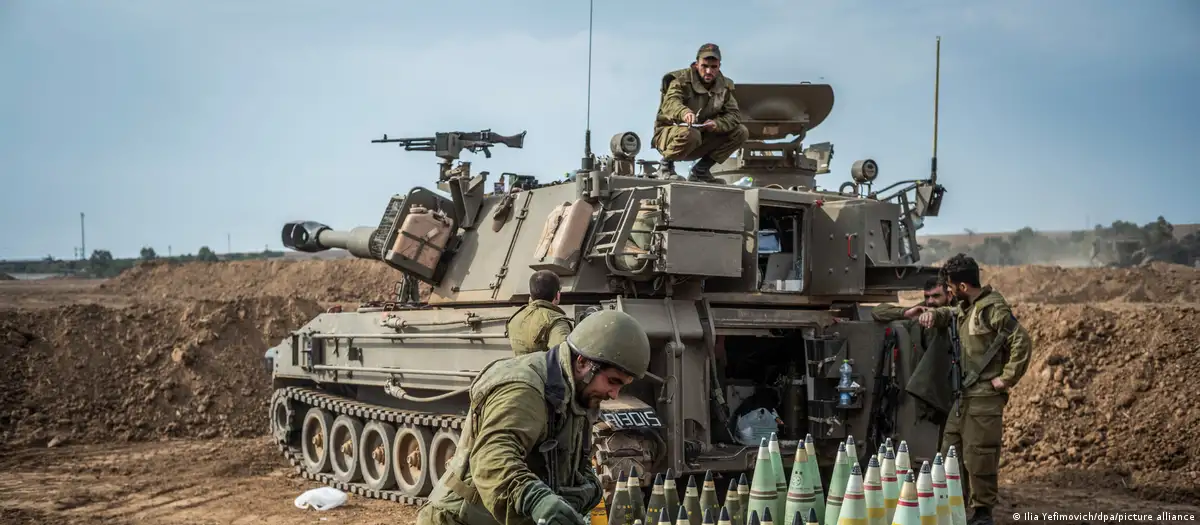The defense minister has indicated that Israel is on the verge of a ground invasion of Gaza, which is under siege and will soon be completely without electricity. 300,000 reservists have been called up.
(DW) Israel’s Armed Forces have concentrated thousands of troops on the outskirts of the Gaza Strip, the Palestinian enclave from where the Hamas terrorists who massacred more than a thousand Israelis over the weekend departed, indicating a potential imminent land invasion of the Palestinian territory.
Since last Saturday, the day of Hamas’ surprise terrorist offensive, Israel has carried out more than 2,000 retaliatory air operations against targets in Gaza. Around 300 took place last night alone. Brigadier Omer Tishler, chief of staff of the Israeli Air Force, said that fighter jets are attacking the Gaza Strip on an “unprecedented scale”.
Gaza health officials said on Wednesday (11/10) that Israel’s intense retaliatory air strikes have left more than 1,000 Palestinians dead and more than 4,000 injured in the enclave. Whole areas of Gaza City, the enclave’s main urban area, have been reduced to ruins.
According to the United Nations, around 200,000 inhabitants of the Gaza Strip, which has a population of just over 2 million, have fled their homes.
On Tuesday, Israel’s Defense Minister Yoav Gallant, speaking to soldiers gathered near Gaza, said: “Hamas wanted to bring about a change and it will have one. What existed in Gaza will no longer exist.”
“We started the offensive from the air and later we will also attack from the ground. We are on the offensive. It will only intensify,” he said, in the most explicit statement yet that Israel is preparing for a ground invasion of Gaza. Since the Hamas attack, Israel has also called up more than 300,000 reservists.
The scale of Hamas’ atrocities is becoming clearer

Gallant’s remarks come as the scale of the atrocities committed by the fundamentalist group Hamas against Israelis over the past weekend begins to become clearer, as Israeli troops regain control of areas taken by the terrorists.
The latest tally shows that the Hamas offensive resulted in the massacre of at least 1,200 people in Israeli territory, including children, women and the elderly. The numbers have been rising steadily since Saturday, with the discovery of more bodies and searches in communities that have been occupied by Hamas.
More than a hundred bodies were found in the Israeli kibbutz Be’eri, an agricultural community near Gaza and one of the first sites raided by terrorists on Saturday. Dozens of bodies were also found in the nearby kibbutz of Kfar Aza. The Israeli newspaper Haaretz described what happened there as “the biggest massacre of Jews since the Holocaust”. Israeli officials have also expressed similar comparisons.
“During my childhood, I heard about the pogroms in Europe, the Holocaust, of course. My whole family came from Europe, they are survivors. But I never thought that my eyes would end up seeing images and things like that,” Israeli Major General Itai Veruv told the American network CNN. “Mothers, fathers, babies, dead families in their beds, in shelters, in the dining room, in their gardens. It’s not a war, it’s not a battlefield. It’s a massacre.”
Among the civilians killed in Israel are citizens of the US, Brazil and France. Several victims were taking part in a music festival taking place a few kilometers from the border with Gaza, which was targeted by Hamas gunmen. At least 260 bodies were found at the site. Two Brazilians who were taking part in the festival were murdered by Hamas.
More than a hundred Israelis and foreigners, including women and the elderly, were also kidnapped by Hamas and taken to Gaza as hostages. On Tuesday, the Israeli ambassador to the United Nations estimated the number of hostages at between 100 and 150.
Hamas has threatened to kill the hostages if Israel does not cease its bombardment of Gaza, but so far there are no indications that any of the hostages have been executed.
Siege of Gaza
In addition to concentrating troops, Israel has ordered a “total siege” of Gaza, cutting off the supply of electricity, water, fuel and food to the enclave, squeezed between Israel, Egypt and the Mediterranean Sea and inhabited by just over 2 million Palestinians.
Two-thirds of the electricity consumed in Gaza depended on Israeli supplies. With the cut-off, the enclave now relies exclusively on a local thermoelectric plant, which is also expected to run out of fuel on Wednesday afternoon, according to local Palestinian authorities. There are fears that the total power cut will severely affect local hospitals, which are already overcrowded with people who were injured in the airstrikes.
Speaking to the Al Jazeera network, Gaza-based reporter Nedal Samir Hamdouna said that conditions in the besieged enclave resemble hell. “I have no words to describe how terrible the situation is here,” he said.
In response to the siege, the World Health Organization (WHO) called on Tuesday for the opening of a humanitarian corridor to Gaza. “A humanitarian corridor is needed to provide essential medical supplies to the populations,” said WHO spokesman Tarik Jasarevic.
On Tuesday, the European Union’s (EU) chief diplomat, Josep Borrell, said that an absolute majority of the bloc’s countries were opposed to the “total siege” imposed on Gaza and the suspension of humanitarian aid to the enclave.
“Israel certainly has the right to defend itself, but it must do so in accordance with the principles of international humanitarian law. We also call for the release of the hostages, as well as access to water, food and medicine, which must also be in accordance with the laws,” said Borrell.

US sends ammunition to Israel
In support of Israel, the US has sent shipments of ammunition to the country’s armed forces. The first plane carrying the material landed at Israel’s Nevatim air base on Tuesday.
On the same day, US President Joe Biden gave another speech in support of the Israelis. “We have to be clear: we support Israel,” said Biden, promising that his country will give Israel all the support it needs to respond to the Hamas attack.
In his speech, Biden said that among those killed in the Hamas offensive are babies and that there are records of women being “raped, beaten and displayed as trophies”.
The US president also said that Hamas does not defend the rights of the Palestinian people, but uses them as a “human shield”. The Hamas attack on Israel also resulted in at least 14 American citizens being killed.
“The brutality of Hamas’ bloodlust brings to mind the worst Isis attacks. This is terrorism,” he said, in reference to the Islamic State group, which in the 2010s became notorious for launching an unprecedented campaign of terror in Syria and Iraq, even declaring the establishment of a “caliphate” in the region.
Clashes on the border with Lebanon
In parallel to the siege of Gaza, Israeli troops also clashed with the terrorist group Hisbollah on Israel’s northern border. The Lebanon-based Shiite group has been firing rockets into Israeli territory.
Israeli troops claimed to have killed three Hisbollah men in the clashes. Three Israeli soldiers also died on Monday in an attack claimed by the Islamic Jihad Movement in Palestine group, which also operates from Lebanon.
Risks involved in land invasion

Over the weekend, Israel’s Prime Minister Benjamin Netanyahu, who promised to “avenge” the weekend massacres, warned Palestinians to leave areas of Gaza where Hamas operates. But with Gaza isolated and under siege, residents say they have nowhere to run.
The last Israeli operation in Gaza to include a ground invasion took place in 2014 and left more than 2,000 dead in the strip, most of them civilians, according to the United Nations. In the long term, the operation also failed to put an end to Hamas, which continued to act and prepare for new attacks, such as the one last weekend.
Since 2014, Israel had preferred to carry out only aerial operations against Hamas, also as a way of limiting potential casualties of Israeli ground troops. But after Saturday’s massacre, different Israeli political and military sectors began to press for more drastic measures against Hamas.
“Anything less than an invasion will be a grave mistake. We need to conquer Gaza, or at least most of it, and destroy Hamas. We can’t keep doing the same things we did before and which aren’t working,” said Amir Avivi, former deputy commander of the Gaza Division of the Israeli Armed Forces.
Israeli troops occupied Gaza for almost four decades, between the 1960s and 2000s. In 2005, Israel unilaterally withdrew from the enclave. However, shortly afterwards, the area fell under the complete control of Hamas, which expelled moderate Palestinian politicians and imposed a fundamentalist regime, while also carrying out regular attacks on Israel. Since 2007, Israel and Egypt – which also opposes Hamas – have imposed a severe economic and traffic blockade on the enclave, which has become even more impoverished during this period.
But Hamas’ seizure of Israeli hostages, including women and the elderly, who were taken through Gaza, should complicate potential plans for a ground invasion. A new ground invasion also raises fears of another bloodbath. Gaza’s urban areas are among the most densely populated on the planet.
jps/as (AP, dpa, Reuters, Lusa, ots, DW)
